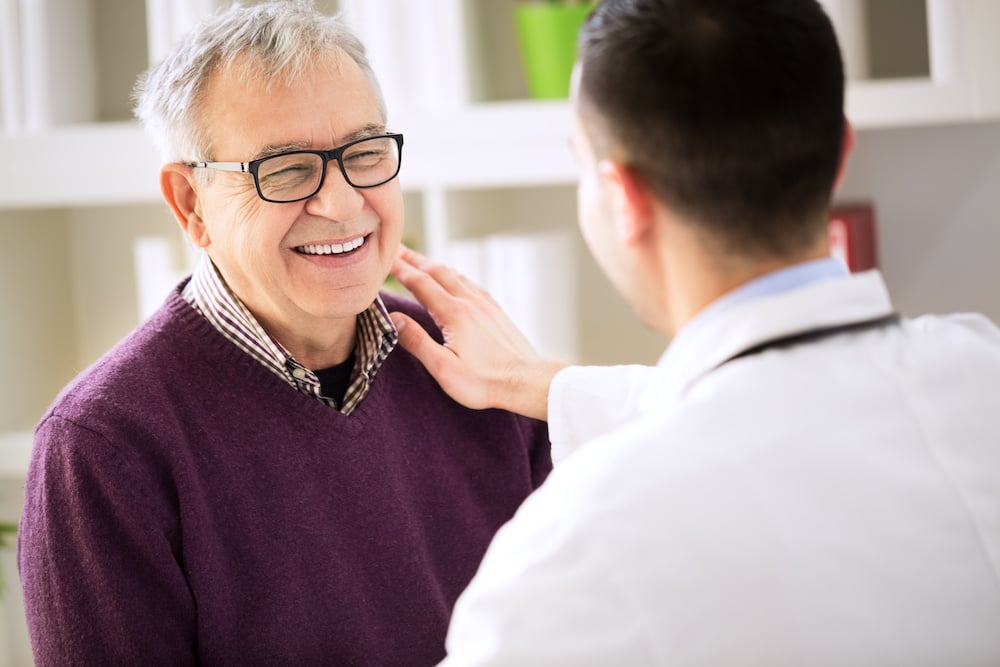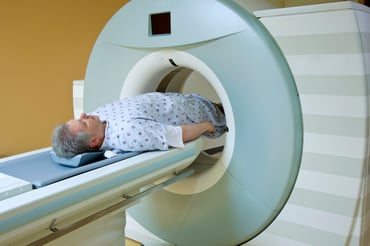
Internal radiation therapy, called brachytherapy, delivers radiation to the prostate from inside the body. There are two types of prostate brachytherapy: low-dose radiation (LDR) and high-dose radiation (HDR). HDR brachytherapy is temporary, meaning the radiation is removed from the body after being directed at the prostate for several minutes at a time. LDR brachytherapy is considered permanent. Small radioactive seeds are inserted into the prostate and left to break down over time. Learn more about brachytherapy for prostate cancer.
After the Procedure
After prostate brachytherapy, you will get medicine for pain before the catheter or applicator is removed. You will be able to go home the same day with the help of your caregiver.
Before you are released, the radiation oncologist or another care team member will give instructions regarding your recovery, including any precautions you need to take. You will also receive a special card to carry with you at all times that explains the details of your radiation treatment.
Caring For Yourself At Home
Many patients experience some pain and discomfort after brachytherapy. The catheter and/or perineal area may feel tender or swollen. There may also be a small amount of blood in your urine or semen. This is common and should stop in one or two days.
Caring for yourself at home involves following the instructions given to you by the radiation oncologist. This may include:
- Avoid heavy lifting and strenuous physical activity. Allowing your body to rest as much as possible is important, especially in the early days after brachytherapy. After a few days to a week, you should be able to return to your regular routine.
- Eat a well-rounded diet and stay hydrated. Choose healthy foods and drink plenty of water or unsweetened juice.
- Manage pain. Icing sore areas, putting antibiotic cream on the surgical site, or taking pain medication prescribed by your doctor can help manage post-treatment pain.
- Refrain from sexual intercourse. Your doctor will provide you with details regarding how long you need to avoid sex and any additional precautions you may need to take, such as wearing a condom.
- Minimize or avoid contact with children or pregnant women if you had low-dose rate brachytherapy. Depending on your radiation dose, this could be weeks to months. For men who received high-dose-rate brachytherapy, the radioactive material is removed after each session. For these patients, there is little concern about exposing others to radiation.
Follow-Up Care
Follow-up care is an essential part of your treatment and safety. You will have regular appointments with your radiation therapy team so they can monitor how your body and the cancer are responding to treatment. Typically, this involves a physical exam and blood tests, including a prostate-specific antigen test (PSA).
Your care team will also help you manage any persistent symptoms or side effects you are experiencing. Be sure to take time during these visits to ask questions and discuss any concerns you have.
Potential Prostate Brachytherapy Side Effects
All prostate cancer treatment comes with the risk of side effects. However, the precision of brachytherapy helps spare surrounding healthy tissue, allowing for fewer side effects than other types of prostate cancer treatment. Still, it’s important to know the potential side effects associated with this type of treatment.
Urinary Problems
Urinary symptoms are the most common side effect of prostate brachytherapy. These symptoms can include:
- Difficulty urinating. The inability to urinate or only being able to urinate a few drops at a time needs to be brought to the attention of your care provider immediately, as it is considered an emergency.
- Pain or discomfort when urinating. A burning sensation when urinating may start 2 to 4 weeks after seed implantation and could last for a few months to a year.
- Frequently feeling an urgent need to urinate. For some men, it could mean 1 or more times per hour. This may start 2 to 4 weeks after seed implantation and could last for several months.
- Blood in the urine. Your urine may appear pink anywhere from 3 to 7 days after the seeds are implanted.
Bowel Changes
Patients may also experience bowel-related side effects, such as:
- Bleeding from the rectum
- Urgent bowel movements
- More-frequent bowel movements
Erectile Dysfunction
Erectile dysfunction (ED), also called impotence, is having trouble or not being able to get an erection. While it’s hard to predict who might be affected by ED and when, prostate cancer treatment with brachytherapy has a lower incidence of impotence than other treatment options.
Symptoms of ED vary among patients. You may notice a change in the strength of your erection. Or, your semen may be different in that there is a change in its consistency or how much you can produce.
Speak with your radiation oncologist if you experience ED, as there are medications that can help in this situation.
When to Call Your Doctor
Many side effects of brachytherapy can be managed and even improve over time. However, there are times when some complications need to be brought to the attention of your radiology specialist or other care provider.
Call your doctor now or seek immediate medical care if you:
- Can’t pass urine or have blood clots in your urine
- Have a fever or chills
- Are bleeding from your rectum
- Develop new pain or pain that worsens over time
- Think you have an infection
- Experience new symptoms, such as a cough, belly pain, vomiting, diarrhea, or a rash
It’s important to monitor your health closely. Contact your doctor if you do not get better as expected.
Coping After Treatment
Coping with the side effects of prostate cancer brachytherapy can be difficult, but there are things you can do and people who can help. Talk openly with your partner about potential changes you might face. Reach out to your family and friends for emotional support. Your radiotherapy team can also provide additional coping strategies and resources to help.
Brachytherapy Prostate Cancer Treatment in the Greater Atlanta Area
If brachytherapy is part of your recommended prostate cancer treatment plan, it’s helpful to choose a cancer specialist close to home. Prostate cancer patients in the greater Atlanta area can receive the latest radiation treatment close to home at any of our centers in Conyers, Covington, Decatur, and Snellville, Georgia.



